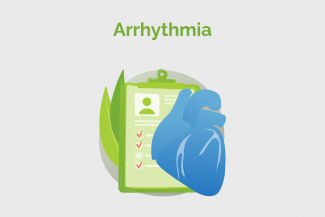Arrhythmias are disorders of the heart’s electrical system, which means there is a change in the regular beat. Arrhythmia should not be dismissed, and it is always advisable to get it checked out. Most palpitations are harmless, but they must be investigated.

What diagnostic tests are conducted to detect an arrhythmia?
Your doctor may ask for the following tests:
- Full blood count (FBC)
- Electrocardiogram (ECG) – this records the electrical activity of your heart to see how well it’s working
- 24-hour heart monitor (ambulatory ECG) – this records the electrical activity of your heart over 24 hours or longer
- Exercise ECG – this can check for other problems with your heart and may trigger abnormal heart rhythms
- Echocardiogram – this uses ultrasound (sound waves) to look at your heart’s structure, valves and pumping action
- Electrophysiological study – this determines if you have any extra electrical pathways in your heart that are causing an abnormal heart rhythm
Changed
29/Dec/2025
Community
Condition

















